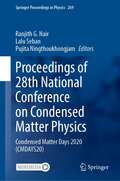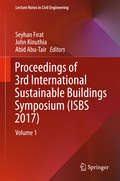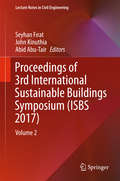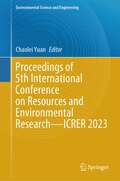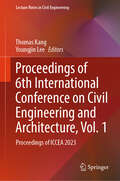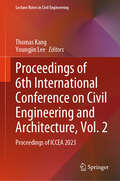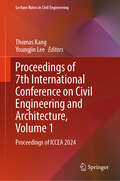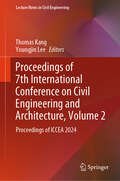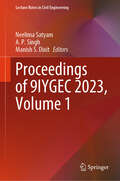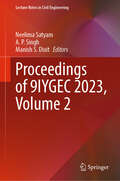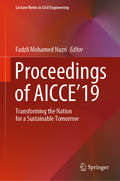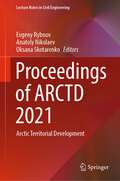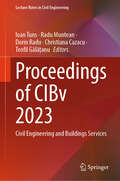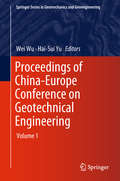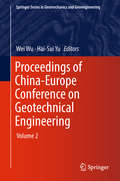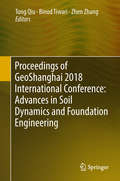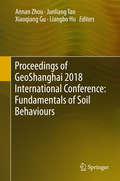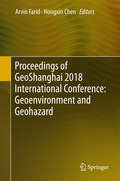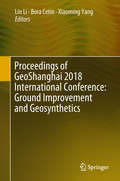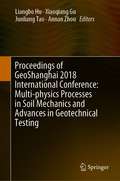- Table View
- List View
Proceedings of 28th National Conference on Condensed Matter Physics: Condensed Matter Days 2020 (CMDAYS20) (Springer Proceedings in Physics #269)
by Ranjith G. Nair Lalu Seban Pujita NingthoukhongjamThis book features selected works presented in the 28th National Conference on Condensed Matter Physics, “Condensed Matter Days (CMDAYS) 2020”, which was held from December 11th to 13th December 2020. The conference brought together seasoned experts and upcoming researchers from all over India to share their research and ideas in the field of condensed matter physics. This book is a glimpse into the works and ideas that were discussed and presented at the conference. It includes works on diverse fields from nanomaterials to fuel cells, photocatalysis to ferromagnetism, application studies to fundamental studies.
Proceedings of 3rd International Sustainable Buildings Symposium: Volume 2 (Lecture Notes in Civil Engineering #7)
by Seyhan Fırat John Kinuthia Abid Abu-TairThis book describes the latest advances, innovations, and applications in the field of building design, environmental engineering and sustainability as presented by leading international researchers, engineers, architects and urban planners at the 3rd International Sustainable Buildings Symposium (ISBS), held in Dubai, UAE from 15 to 17 March 2017. It covers highly diverse topics, including smart cities, sustainable building and construction design, sustainable urban planning, infrastructure development, structural resilience under natural hazards, water and waste management, energy efficiency, climate change impacts, life cycle assessment, environmental policies, and strengthening and rehabilitation of structures. The contributions amply demonstrate that sustainable building design is key to protecting and preserving natural resources, economic growth, cultural heritage and public health. The contributions were selected by means of a rigorous peer-review process and highlight many exciting ideas that will spur novel research directions and foster multidisciplinary collaboration among different specialists.
Proceedings of 3rd International Sustainable Buildings Symposium: Volume 2 (Lecture Notes in Civil Engineering #7)
by Seyhan Fırat John Kinuthia Abid Abu-TairThis book describes the latest advances, innovations, and applications in the field of building design, environmental engineering and sustainability as presented by leading international researchers, engineers, architects and urban planners at the 3rd International Sustainable Buildings Symposium (ISBS), held in Dubai, UAE from 15 to 17 March 2017. It covers highly diverse topics, including smart cities, sustainable building and construction design, sustainable urban planning, infrastructure development, structural resilience under natural hazards, water and waste management, energy efficiency, climate change impacts, life cycle assessment, environmental policies, and strengthening and rehabilitation of structures. The contributions amply demonstrate that sustainable building design is key to protecting and preserving natural resources, economic growth, cultural heritage and public health. The contributions were selected by means of a rigorous peer-review process and highlight many exciting ideas that will spur novel research directions and foster multidisciplinary collaboration among different specialists.
Proceedings of 5th International Conference on Civil Engineering and Architecture: Proceedings of ICCEA 2022 (Lecture Notes in Civil Engineering #369)
by Thomas KangThis book states that the proceedings gathers selected papers from 2022 5th International Conference on Civil Engineering and Architecture (ICCEA 2022), which was held in Hanoi, Vietnam on December 16-18, 2022. The conference is the premier forum for the presentation of new advances and research results in the fields of theoretical, experimental, and practical civil engineering and architecture. And this proceedings from the conference mainly discusses architectural design and project management, environmental protection and spatial planning, design and analysis of building materials, and structural engineering and safety. And these materials can be useful and valuable sources for researchers and professionals working in the field of civil engineering and architecture.
Proceedings of 5th International Conference on Resources and Environmental Research—ICRER 2023 (Environmental Science and Engineering)
by Chaolei YuanThe field of resources and environmental research has seen a surge in interest and development. To compile the latest findings, this book presents peer-reviewed abstracts and papers from the 2023 5th International Conference on Resources and Environmental Research (ICRER 2023). This comprehensive collection offers insight into various areas including natural resource management, water resources and river basin management, solid waste management, soil, water, and air pollution control, climatic changes, ecosystem management, and sustainable development. This book provides professionals and researchers in the area of natural resources and environmental sciences with an up-to-date reference.
Proceedings of 6th International Conference on Civil Engineering and Architecture, Vol. 1: Proceedings of ICCEA 2023 (Lecture Notes in Civil Engineering #530)
by Thomas Kang Youngjin LeeThe book presents the selected and peer reviewed papers of 2023 6th International Conference on Civil Engineering and Architecture (ICCEA 2023), held in Bali Island, Indonesia on December 16-18, 2023. This volume of proceedings includes a lot of smart and green solutions for challenges on civil infrastructure construction and architectural design. The book highlights attempts made by the researchers and practitioners to solve architectural planning issues by using state-of-the-art technologies and engaging in a lot of case studies and practices. This volume provides a valuable and useful reference for the people from both in academia and industry who are working in the field of civil engineering and architecture.
Proceedings of 6th International Conference on Civil Engineering and Architecture, Vol. 2: Proceedings of ICCEA 2023 (Lecture Notes in Civil Engineering #531)
by Thomas Kang Youngjin LeeThe book presents the selected and peer reviewed papers of 2023 6th International Conference on Civil Engineering and Architecture (ICCEA 2023), held in Bali Island, Indonesia on December 16-18, 2023. This volume of proceedings includes a lot of smart and green solutions for challenges on civil infrastructure construction and architectural design. The book highlights attempts made by the researchers and practitioners to solve architectural planning issues by using state-of-the-art technologies and engaging in a lot of case studies and practices. This volume provides a valuable and useful reference for the people from both in academia and industry who are working in the field of civil engineering and architecture.
Proceedings of 7th International Conference on Civil Engineering and Architecture, Volume 1: Proceedings of ICCEA 2024 (Lecture Notes in Civil Engineering #640)
by Thomas Kang Youngjin LeeThis book states that the proceedings gathers selected papers from 7th International Conference on Civil Engineering and Architecture (ICCEA 2024), which was held in Da Nang, Vietnam on December 7-9, 2024. The conference is the premier forum for the presentation of new advances and research results in the fields of theoretical, experimental, and practical civil engineering and architecture. And this proceedings from the conference mainly discusses architectural design and project management, environmental protection and spatial planning, design and analysis of building materials, and structural engineering and safety. And these materials can be useful and valuable sources for researchers and professionals working in the field of civil engineering and architecture.
Proceedings of 7th International Conference on Civil Engineering and Architecture, Volume 2: Proceedings of ICCEA 2024 (Lecture Notes in Civil Engineering #641)
by Thomas Kang Youngjin LeeThis book states that the proceedings gathers selected papers from 7th International Conference on Civil Engineering and Architecture (ICCEA 2024), which was held in Da Nang, Vietnam on December 7-9, 2024. The conference is the premier forum for the presentation of new advances and research results in the fields of theoretical, experimental, and practical civil engineering and architecture. And this proceedings from the conference mainly discusses architectural design and project management, environmental protection and spatial planning, design and analysis of building materials, and structural engineering and safety. And these materials can be useful and valuable sources for researchers and professionals working in the field of civil engineering and architecture.
Proceedings of 9IYGEC 2023, Volume 1 (Lecture Notes in Civil Engineering #605)
by Neelima Satyam A. P. Singh Manish S. DixitThis book presents peer reviewed papers from the proceedings of the 9th Indian Young Geotechnical Engineers conference (9IYGEC), 21-22 March 2023, held at MIT Aurangabad. The topics covered are advanced ground improvement techniques, geosynthetics and its application, geotechnical site investigations and case studies, tunneling and underground structures, slope stability, shallow and deep foundations, landslides, and so on. The book discusses various properties and performance attributes of Geotechnical Engineering and Foundation Engineering. This book is a valuable reference book for beginners, researchers, academician, and professionals interested in geotechnical engineering covering the design and execution of foundations and other structures for variety of infrastructural projects.
Proceedings of 9IYGEC 2023, Volume 2 (Lecture Notes in Civil Engineering #606)
by Neelima Satyam A. P. Singh Manish S. DixitThis book presents peer reviewed papers from the proceedings of the 9th Indian Young Geotechnical Engineers conference (9IYGEC), 21-22 March 2023, held at MIT Aurangabad. The topics covered are advanced ground improvement techniques, geosynthetics and its application, geotechnical site investigations and case studies, tunneling and underground structures, slope stability, shallow and deep foundations, landslides, and so on. The book discusses various properties and performance attributes of Geotechnical Engineering and Foundation Engineering. This book is a valuable reference book for beginners, researchers, academician, and professionals interested in geotechnical engineering covering the design and execution of foundations and other structures for variety of infrastructural projects.
Proceedings of AICCE'19: Transforming the Nation for a Sustainable Tomorrow (Lecture Notes in Civil Engineering #53)
by Fadzli Mohamed NazriThis book gathers the latest research, innovations, and applications in the field of civil engineering, as presented by leading national and international academics, researchers, engineers, and postgraduate students at the AWAM International Conference on Civil Engineering 2019 (AICCE’19), held in Penang, Malaysia on August 21-22, 2019. The book covers highly diverse topics in the main fields of civil engineering, including structural and earthquake engineering, environmental engineering, geotechnical engineering, highway and transportation engineering, water resources engineering, and geomatic and construction management. In line with the conference theme, “Transforming the Nation for a Sustainable Tomorrow”, which relates to the United Nations’ 17 Global Goals for Sustainable Development, it highlights important elements in the planning and development stages to establish design standards beneficial to the environment and its surroundings. The contributions introduce numerous exciting ideas that spur novel research directions and foster multidisciplinary collaborations between various specialists in the field of civil engineering.
Proceedings of ARCTD 2021: Arctic Territorial Development (Lecture Notes in Civil Engineering #206)
by Evgeny Rybnov Anatoly Nikolaev Oksana SkotarenkoThis book gathers the latest advances, innovations, and applications in the field of sustainable territorial development of the Arctic, as presented by international researchers and engineers at the International Scientific Conference Arctic Territorial Development: Challenges & Solutions (ARCTD), held in St. Petersburg, Russia, on September 29-30, 2021. It covers highly diverse topics, including architecture and urban planning in the Far North, engineering, construction and operation of buildings, utilities and transport infrastructure, development and application of energy-saving materials and technologies for construction, fuel and energy complex and utility services, improving the durability and operational reliability of technological machines, economic potential for sustainable development of the Arctic territories. The contributions, which were selected by means of a rigorous international peer-review process, highlight numerous exciting ideas that will spur novel research directions and foster multidisciplinary collaborations.
Proceedings of AWAM International Conference on Civil Engineering 2022 - Volume 3: AICCE, Sustainability and Resiliency (Lecture Notes in Civil Engineering #386)
by Nuridah SabtuThis book gathers the latest research, innovations, and applications in the field of civil engineering, as presented by leading national and international academics, researchers, engineers, and postgraduate students at the AWAM International Conference on Civil Engineering 2022 (AICCE’22), held in Penang, Malaysia on February 15-17, 2022. The book covers highly diverse topics in the main fields of civil engineering, including structural and earthquake engineering, environmental engineering, geotechnical engineering, highway and transportation engineering, water resources engineering, and geomatic and construction management. In line with the conference theme, “Sustainability And Resiliency: Re-Engineering the Future”, which relates to the United Nations’ 17 Global Goals for Sustainable Development, it highlights important elements in the planning and development stages to establish design standards beneficial to the environment and its surroundings. The contributions introduce numerous exciting ideas that spur novel research directions and foster multidisciplinary collaborations between various specialists in the field of civil engineering.This book is part of a 3-volume series of these conference proceedings, it represents Volume 3 in the series.
Proceedings of AWAM International Conference on Civil Engineering 2022—Volume 1: AICCE, Sustainability and Resiliency (Lecture Notes in Civil Engineering #384)
by Nuridah SabtuThis book gathers the latest research, innovations, and applications in the field of civil engineering, as presented by leading national and international academics, researchers, engineers, and postgraduate students at the AWAM International Conference on Civil Engineering 2022 (AICCE’22), held in Penang, Malaysia on February 15-17, 2022. The book covers highly diverse topics in the main fields of civil engineering, including structural and earthquake engineering, environmental engineering, geotechnical engineering, highway and transportation engineering, water resources engineering, and geomatic and construction management. In line with the conference theme, “Sustainability And Resiliency: Re-Engineering the Future”, which relates to the United Nations’ 17 Global Goals for Sustainable Development, it highlights important elements in the planning and development stages to establish design standards beneficial to the environment and its surroundings. The contributions introduce numerous exciting ideas that spur novel research directions and foster multidisciplinary collaborations between various specialists in the field of civil engineering.This book is part of a 3-volume series of these conference proceedings, it represents Volume 1 in the series.
Proceedings of AWAM International Conference on Civil Engineering 2022—Volume 2: AICCE, Sustainability and Resiliency (Lecture Notes in Civil Engineering #385)
by Nuridah SabtuThis book gathers the latest research, innovations, and applications in the field of civil engineering, as presented by leading national and international academics, researchers, engineers, and postgraduate students at the AWAM International Conference on Civil Engineering 2022 (AICCE’22), held in Penang, Malaysia on February 15-17, 2022. The book covers highly diverse topics in the main fields of civil engineering, including structural and earthquake engineering, environmental engineering, geotechnical engineering, highway and transportation engineering, water resources engineering, and geomatic and construction management. In line with the conference theme, “Sustainability And Resiliency: Re-Engineering the Future”, which relates to the United Nations’ 17 Global Goals for Sustainable Development, it highlights important elements in the planning and development stages to establish design standards beneficial to the environment and its surroundings. The contributions introduce numerous exciting ideas that spur novel research directions and foster multidisciplinary collaborations between various specialists in the field of civil engineering.This book is part of a 3-volume series of these conference proceedings, it represents Volume 2 in the series.
Proceedings of CIBv 2023: Civil Engineering and Buildings Services (Lecture Notes in Civil Engineering #510)
by Ioan Tuns Radu Muntean Dorin Radu Christiana Cazacu Teofil GălățanuThis book gathers the proceedings of the 18th International Conference on Civil Engineering and Buildings Services (CIBv), held in Brașov, Romania on November 2-3, 2023. It covers highly diverse topics such as structural analysis and optimization, concrete, steel and timber structures, computer aided design of structures, railways, roads and bridges, geotechnics and foundations, experimental methods in the investigation of structures, new and improved building materials, risk assessment of natural hazards, advanced energy design for HVAC installations, energy performance of buildings, and efficient buildings. Written by leading researchers and engineers, and selected by means of a rigorous international peer-review process, the contributions highlight numerous exciting ideas that will spur novel research directions and foster multidisciplinary collaborations.
Proceedings of CIBv 2024: Civil Engineering and Buildings Services (Lecture Notes in Civil Engineering #665)
by Ioan Tuns Radu Muntean Christiana Cazacu Teofil Gălățanu Mircea ConțiuThis book gathers the proceedings of the 19th International Conference on Civil Engineering and Buildings Services (CIBv), held in Brașov, Romania, on November 7–8, 2024. It covers highly diverse topics such as structural analysis and optimization, concrete, steel and timber structures, computer aided design of structures, railways, roads and bridges, geotechnics and foundations, experimental methods in the investigation of structures, new and improved building materials, risk assessment of natural hazards, advanced energy design for HVAC installations, energy performance of buildings, and efficient buildings. Written by leading researchers and engineers, and selected by means of a rigorous international peer-review process, the contributions highlight numerous exciting ideas that will spur novel research directions and foster multidisciplinary collaborations.
Proceedings of China-Europe Conference on Geotechnical Engineering: Volume 2 (Springer Series in Geomechanics and Geoengineering)
by Wei Wu Hai-Sui YuThis book compiles the first part of contributions to the China–Europe Conference on Geotechnical Engineering held 13.-16. August 2016 in Vienna, Austria. About 400 papers from 35 countries cover virtually all areas of geotechnical engineering and make this conference a truly international event. The contributions are grouped into thirteen special sessions and provide an overview of the geoengineering research and practice in China, Europe and the world: · Constitutive model · Micro-macro relationship · Numerical simulation · Laboratory testing · Geotechnical monitoring, instrumentation and field test · Foundation engineering · Underground construction · Environmental geotechnics · New geomaterials and ground improvement · Cold regions geotechnical engineering · Geohazards – risk assessment, mitigation and prevention · Unsaturated soils and energy geotechnics · Geotechnics in transportation, structural and hydraulic Engineering
Proceedings of China-Europe Conference on Geotechnical Engineering: Volume 2 (Springer Series in Geomechanics and Geoengineering)
by Wei Wu Hai-Sui YuThis book compiles the second part of contributions to the China–Europe Conference on Geotechnical Engineering held 13.-16. August 2018 in Vienna, Austria. About 400 papers from 35 countries cover virtually all areas of geotechnical engineering and make this conference a truly international event. The contributions are grouped into thirteen special sessions and provide an overview of the geoengineering research and practice in China, Europe and the world: · Constitutive model · Micro-macro relationship · Numerical simulation · Laboratory testing · Geotechnical monitoring, instrumentation and field test · Foundation engineering · Underground construction · Environmental geotechnics · New geomaterials and ground improvement · Cold regions geotechnical engineering · Geohazards – risk assessment, mitigation and prevention · Unsaturated soils and energy geotechnics · Geotechnics in transportation, structural and hydraulic Engineering
Proceedings of GeoShanghai 2018 International Conference: Advances in Soil Dynamics and Foundation Engineering
by Zhen Zhang Binod Tiwari Tong QiuThis book is the sixth volume of the proceedings of the 4th GeoShanghai International Conference that was held on May 27 - 30, 2018. This volume, entitled “Advances in Soil Dynamics and Foundation Engineering”, covers the recent advances and technologies in soil dynamics and foundation engineering. These papers are grouped into four categories: (1) soil dynamics and earthquake engineering, (2) deep excavations and retaining structures, (3) shafts and deep foundations, and (4) offshore geotechnics. It presents the state-of-the-art theories, experiments, methodologies and findings in the related areas. The book may benefit researchers and scientists from the academic fields of soil dynamics and earthquake engineering, geotechnical engineering, geoenvironmental engineering, transportation engineering, geology, mining and energy, as well as practical engineers from the industry. Each of the papers included in this book received at least two positive peer reviews. The editors would like to express their sincerest appreciation to all of the anonymous reviewers all over the world, for their diligent work.
Proceedings of GeoShanghai 2018 International Conference: Fundamentals of Soil Behaviours
by Liangbo Hu Xiaoqiang Gu Junliang Tao Annan ZhouThis book is the second volume of the proceedings of the 4th GeoShanghai International Conference that was held on May 27 - 30, 2018. The book, entitled “Fundamentals of Soil Behaviours”, presents the recent advances and technology in the understanding and modelling of fundamentals of soil’s behaviours. The subject of this book covers a wide range of topics related to soil behaviours in geotechnical engineering, geoenvironmental engineering and transportation engineering. The state-of-the-art theories, methodologies and findings in the related topics are included. This book may benefit researchers and scientists from the academic fields of soil and rock mechanics, geotechnical engineering, geoenvironmental engineering, transportation engineering, geology, mining and energy, as well as practical engineers from industry.Each of the papers included in this book received at least two positive peer reviews. The editors would like to express their sincerest appreciation to all of the anonymous reviewers all over the world, for their diligent work.
Proceedings of GeoShanghai 2018 International Conference: Geoenvironment and Geohazard
by Arvin Farid Hongxin ChenThis book is the seventh volume of the proceedings of the 4th GeoShanghai International Conference that was held on May 27 - 30, 2018. This volume, entitled “Geoenvironment and Geohazards”, presents the recent advances and technology in geoenvironmental engineering and geohazards. The state-of-the-art theories, methodologies and findings in the related topics are included. This book may benefit researchers and scientists from the academic fields of soil & rock mechanics, geotechnical engineering, geoenvironmental engineering, transportation engineering, geology, mining and energy, as well as practical engineers from the industry.Each of the papers included in this book received at least two positive peer reviews. The editors would like to express their sincerest appreciation to all of the anonymous reviewers all over the world, for their diligent work.
Proceedings of GeoShanghai 2018 International Conference: Ground Improvement and Geosynthetics
by Lin Li Bora Cetin Xiaoming YangThis book is the eighth volume of the proceedings of the 4th GeoShanghai International Conference that was held on May 27 - 30, 2018. This book, entitled Ground Improvement and Geosynthetics”, presents the latest information on the new technologies and practical applications in various geotechnical engineering projects and advancements on ground improvement and geosynethetics. This volume presents detailed design procedures and examples to demonstrate the applications of the latest ground improvement technologies and innovative geosynethetics in geotechnical engineering. Topics include pile/column technology as foundations, retaining structures, or embankment supports, physical and chemical technologies for soil stabilization and ground improvement, geosynthetic reinforcement for roads, slopes, retaining walls, and foundations.Each of the papers included in this book received at least two positive peer reviews. The editors would like to express their sincerest appreciation to all of the anonymous reviewers all over the world, for their diligent work.
Proceedings of GeoShanghai 2018 International Conference: Multi-physics Processes in Soil Mechanics and Advances in Geotechnical Testing
by Liangbo Hu Xiaoqiang Gu Junliang Tao Annan ZhouThis book is the second volume of the proceedings of the 4th GeoShanghai International Conference that was held on May 27 - 30, 2018. This conference showcased the recent advances and technology in geotechnical engineering, geoenvironmental engineering and transportation engineering. This volume, entitled “Multi-physics Processes in Soil Mechanics and Advances in Geotechnical Testing”, covers a wide range of topics in soil mechanics, focusing on the behaviours of partially saturated soils, combined effects of multi-physics processes in geological materials and systems, and emerging methods and techniques in geotechnical in-situ testing and monitoring. This book may benefit researchers and scientists from the academic fields of soil and rock mechanics, geotechnical engineering, geoenvironmental engineering, transportation engineering, geology, mining and energy, as well as practical engineers from the industry.Each of the papers included in this book received at least two positive peer reviews. The editors would like to express their sincerest appreciation to all of the anonymous reviewers all over the world, for their diligent work.
